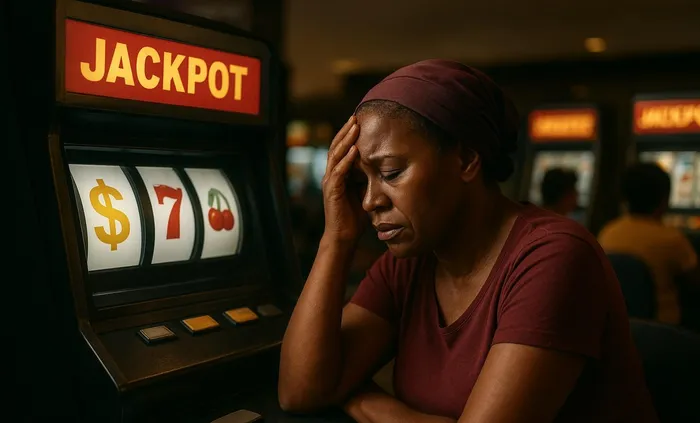‘Gambling drained money meant for survival and perpetuated poverty’
SA’s R1.5 trillion gambling crisis

The money won will never make up for all the losses.
Image: Gerry Cupido / ChatGPT
SOUTH Africa faces a gambling crisis with a staggering R1.5 trillion national turnover, as experts reveal social grants meant to alleviate poverty are increasingly being diverted to betting.
The South African Responsible Gambling Foundation reports alarming statistics across all age groups and income levels, with thousands seeking help for addiction issues.
Sibongile Simelane-Quntana, executive director of the South African Responsible Gambling Foundation (SARGF), said the country’s gambling patterns reflected a complex mix of economic pressures, social influences, and biological vulnerabilities.
“The National Gambling Board reported a R1.5 trillion gambling turnover. Various factors could be driving or influencing people to gamble, which may include environmental, social, psychological, and biological factors,” said Simelane-Quntana.
“Environmental factors include accessibility and availability of gambling opportunities, advertising and promotional free vouchers when you open an online betting account, and socio-economic factors such as high consumer inflation and cost of living, the high levels of unemployment, and inequality.
“Social factors could be peer influence, family environment, cultural attitudes towards gambling, learnt behaviour through socialisation, and the normalisation of betting and gambling. Psychological factors include personality traits, coping mechanisms, escapism, mental health conditions, and substance abuse such as alcohol and drugs,” she added.
Simelane-Quntana said gambling stimulated dopamine release at levels up to ten times greater than natural rewards such as eating or social interaction.
“This intense surge of dopamine results in a temporary feeling of euphoria. However, with repeated exposure, the brain gradually adapts to these high dopamine levels. This adaptation reduces the brain’s responsiveness, making it increasingly difficult for individuals to experience satisfaction from everyday events, a process referred to as tolerance.”
She said as gambling behaviour intensified, it altered the brain’s ability to manage impulse control and decision-making.
“As individuals continue to gamble, the repeated exposure to gambling-related stimuli reinforces these behavioural patterns and increases the risk of developing an addiction,” she said.
Simelane-Quntana added that research showed similarities between gambling and substance use disorders.
“Brain imaging studies have shown that individuals affected by gambling disorder often experience changes in brain activity that are similar to those observed in people with substance use disorders. Both groups tend to display decreased activity in areas responsible for self-control, while also showing increased reactivity to gambling cues or betting opportunities,” she said.
She also highlighted how social grants, intended to improve living conditions, were sometimes misused for gambling.
“The main purpose of grants was to help alleviate poverty and improve living standards by assisting with basic needs like food, shelter, and education. The government, however, has no control over how recipients spend their grants outside of what it was intended for.
“Socio-economic factors such as high consumer inflation and cost of living, high levels of unemployment, inequality, and poverty may be contributing to the increased number of recipients using their grants to gamble or bet. The National Responsible Gambling Programme (NRGP) referral and treatment data show us that those in informal part-time jobs find it hard to qualify for social grants and prefer to get their R350 social relief grant cash, and use it to gamble.”
Between April 2024 and March 2025, the SARGF received 4 166 referrals through its toll-free counselling line:
- Youth: 2 034
- Adults: 1 727
- Elderly: 385
- Unstated: 20
Gender:
- Males: 2 144
- Females: 2 052
Employment Status:
- Full-time: 2 362
- Part-time: 302
- Pensioners: 68
- Self-employed: 515
- Students: 163
- Unemployed (Social relief grant recipients): 752
- Unknown: 4
Top 10 preferred modes of gambling:
- Bookmaker – online betting
- Casino slot machines
- Bookmaker – betting on sports
- Bookmaker – betting on non-sports
- Illegal gambling – online
- LPM slot machines
- Lotto – sports betting
- Bookmakers – betting on fixed odds
- Casino roulette
- Lotto number
Simelane-Quntana said they continued to collaborate with national and provincial gambling boards to promote awareness and prevention, particularly among social grant recipients.
“We also offer free responsible gambling training for social workers and healthcare professionals.”
Simelane-Quntana warned that gambling drained money meant for survival needs and perpetuated poverty.
“They are unable to meet their immediate day-to-day needs, and money should be assisting poverty, diverted into gambling, which results in chasing losses and getting trapped in the cycle of debt. Financial literacy and budgeting education are critical for these vulnerable groups,” said Simelane-Quntana.